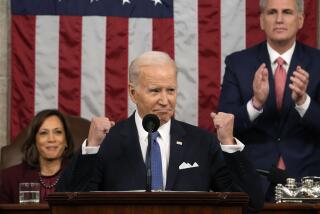Brazil’s president, angry about spying, cancels state visit to U.S.

WASHINGTON — In the latest fallout from the Edward Snowden affair, the president of Brazil canceled a state visit to Washington out of anger that the National Security Agency had spied on her and other Brazilian officials, deepening a rift with the Obama administration.
Brazilian President Dilma Rousseff on Tuesday called off the high-profile visit that both governments had planned for Oct. 23. A White House spokesman sought to downplay the diplomatic snub by a key ally and trading partner, and described the decision to indefinitely postpone the visit as mutual.
The White House said in a statement that Rousseff and President Obama had agreed that the state visit — an elaborate affair with meetings and a formal dinner with toasts — would be better staged when relations between the two nations were less tense.
Obama “understands and regrets” the concern that disclosures about U.S. spying has generated in Brazil, the statement said. “He is committed to working together with President Rousseff and her government in diplomatic channels to move beyond this issue as a source of tension in our bilateral relationship.”
A statement from the Brazilian president’s office was harsher, citing a “lack of ... explanations and commitment to cease interceptive activities” for the cancellation.
“The illegal interception of communications data belonging to citizens, companies and members of the Brazilian government are a grave matter, an assault on national sovereignty and individual rights, and are incompatible with relations between friendly nations,” the statement said.
Since July, Brazilian news organizations have carried three reports based on classified documents leaked by Snowden, a former systems administrator at an NSA listening post. One indicated that the intelligence agency had intercepted communications between Rousseff and her aides, among other senior officials.
Rousseff quickly denounced the eavesdropping, and aides said she wanted an apology from Obama and was reconsidering her invitation to Washington.
Obama tried to head off the rebuke. At a meeting this month of the Group of 20 nations in St. Petersburg, Russia, he added a meeting with Rousseff to his schedule and offered to address her concerns. National security advisor Susan Rice met with her Brazilian counterpart last week.
But the outreach failed. On Monday, the two leaders spoke by phone and agreed to delay the pomp and circumstance of a state visit so it would “not be overshadowed by a single bilateral issue, no matter how important or challenging the issue may be,” the White House said.
The cancellation marks the second presidential visit scrapped because of diplomatic umbrage related to Snowden and the trove of secret surveillance documents he has leaked to news media.
Obama canceled a planned meeting in Moscow with Russian President Vladimir Putin last month after Putin offered Snowden temporary asylum. The two leaders met informally days later in St. Petersburg, however, and both governments have endorsed a joint plan to disarm Syria of chemical weapons.
The invitation to Rousseff, the only state visit the White House had planned this year, was widely seen in Brazil as affirmation of its rising status on the international stage. But Rousseff appears to have calculated that reprimanding Washington over spying was more important for her domestic audience than a sit-down in the Oval Office.
“Slapping Obama in the face, standing up to the big neighbor in the North, will be much hyped here and could increase her popularity as she faces elections next year,” said David Fleischer, a political scientist at the University of Brasilia. “It increases Brazil’s standing in the world by saying we can stand up to the U.S. when they did something very nasty to us.”
“The issue of spying would have dominated the Washington visit,” said Peter Hakim, president emeritus at the Inter-American Dialogue, a Washington think tank that focuses on relations with Latin America. “And Rousseff must have been nervous that something more could come out [from Snowden] before then.”
A Brazilian government commission met Tuesday with officials at the Russian Embassy to explore the possibility of a visit to Russia to meet with Snowden. Rousseff also is promoting legislation that would require Google, Facebook and other technology companies to store data collected in Brazil on Brazilian soil and therefore submit it to Brazilian law. Rousseff plans to speak on spying at the United Nations General Assembly next week.
The White House glossed over the downturn in relations, but the delay could have implications for U.S. businesses. Among the likely topics of discussion were a multibillion-dollar contract to sell Boeing aircraft, as well as access to oil fields for U.S. companies, said Carl Meacham, director of the Americas Program at the Center for Strategic and International Studies.
“This signals a different kind of environment for the U.S.,” said Meacham.
kathleen.hennessey@latimes.com
Times staff writer Hennessey reported from Washington and special correspondent Bevins from Sao Paulo, Brazil. Staff writer Christi Parsons in Washington contributed to this report.
More to Read
Sign up for Essential California
The most important California stories and recommendations in your inbox every morning.
You may occasionally receive promotional content from the Los Angeles Times.











